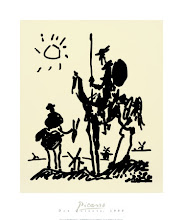I have been closely scrutinised by strangers lately, or to give you a precise period, since April. I will explain.
Partly willingly and partly forced, I decided to change my job or, as people normally say, to move on to pastures new. I quite enjoyed the challenge of an interview, those precious minutes when a good chunk is at stake and, in spite of all the psychological pressure, you have to make the best out of that moment. I dare say: it’s a dignifying experience, or may well be considered as such, for not only are you having the opportunity to expose what you have best but you are also running against all the odds.
I was resolute in my success for “at the end of the day,” I said to myself, “I live in London, this vibrant professional market with opportunities close to hand to everyone.” But my assessment proved ill.
Hundreds of applications, dozens of telephone calls from recruiters, a few interviews. Through recruiters I found out that thousands of people are out in the market looking for a job, well-qualified (and unemployed) people who are on purpose downgrading their expectation in order to get a job. By being interviewed I also found out, to my astonishment, that before being shortlisted for the first stage of the recruitment process I was running for the position with over one hundred candidates. One vacancy, more than one hundred CVs! The picture started to be not that attractive.
I had a few interviews, as I said. And I must confess – the prospect of an interview, actually the taking place of one, unveils an entire world. It’s like a fairy tale, full of imagination, expectations, dreams. After a while and a few interviews you start to tame your feelings, it’s true. Yet they are there, waiting for an opportunity to erupt.
The format of these interviews was similar. The behaviour of the interviewers, to a certain extent, had some similarity too. They were rather formal and followed some formal procedure. They were managers – at times, managers and directors. They went with me through my CV in meetings which lasted on average 45 minutes. On the second stage of the recruitment process, invariably, I had a task to undertake and present, be it in slide or otherwise. So it had been until last week.
It happened that I came across with a company, my last interview, which gave me a complete different picture of a recruitment process, and made a positive impression on me.
Firstly, the premises. I was used to wonderful premises but this one looked like a warehouse. (It actually is, with offices adapted.) Then came the interview, which was with the Head of Marketing. Pretty informal. Competency-based questions mostly; going through my CV as usual. I was successful. As to the second stage, no task but another interview, at this time with the CEO. I thought to myself: “It’s odd to see the CEO involved in the recruitment of such a junior position.” I was trying to figure out, in vain, what could come next. I stopped wondering and went for it.
The company has a culture of which everyone is proud and by all means fight to preserve it and bring in like-minded people, so I was told. From the very beginning the interview was informal. “Our most valuable assets are our people and our financial resources. The employees make use of the money in the best possible way in order to achieve the best results. That’s why I need the right people in the business. I’m not here to sell you the position; I’m here to explain to you how the company works and what we consider important so that we can both come to the conclusion if we can work together. Therefore I won’t ask you competency-based questions for I believe this was already covered in the previous interview. Nor will I go through your CV in details. In reality I would like to know you better, so I will ask you some personal questions and will give you the opportunity to ask me questions as well.” So we went for an hour.
I felt I was before an astute and intelligent guy, someone with sharp eyes and nostrils able to spot and smell a good opportunity afar. Automatically I understood why the CEO was involved in the recruitment of a junior staff. He was doing business, was taking care of what the company holds paramount, namely its employees. For the first time during these months I had a genuine belief in a recruitment process.
Saturday, 12 September 2009
Subscribe to:
Post Comments (Atom)


2 comments:
Wish you all the best, Ranyere.
God bless.
Sonia
Hey Ranyere,
Just reading your blog after you wrote to me just now. Good to hear that even the people at the top care about the people at the bottom. Great story, all the best to you!
Chris S./Eurolondon
Post a Comment